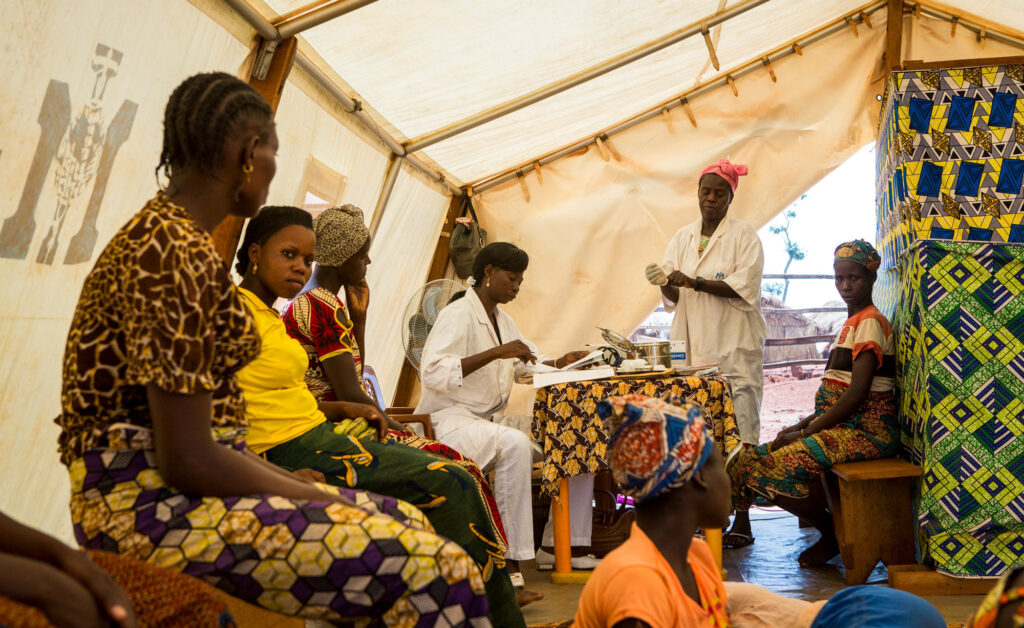
Central African Republic
One of the world’s poorest countries, the Central African Republic (CAR) has been plagued with bouts of political turmoil and unrest since it won independence from France in 1960. Since the country’s latest round of violence began in 2013, one in four Central Africans has been forcibly displaced, contributing to a major crisis that has grown in the region.
Following presidential elections in December 2020, the security situation in CAR deteriorated significantly, with increasing violence in much of the country, including the capital, Bangui. The country is currently under a state of emergency and permanent curfew, and remains one of the most dangerous countries in the world for humanitarian actors.
International Medical Corps has been providing lifesaving services to internally displaced persons (IDPs), refugees and conflict-affected host communities in CAR since 2007, and remains one of the few international organizations with a presence in the country’s troubled northeastern region.

5.7 million
60/55
male/female
445,536
The Challenges
Our Response

Primary Healthcare
Due to ongoing conflict within CAR, International Medical Corps staff members often operate under intense pressure, as teams deliver emergency medical care and conduct surgeries for victims of conflict. Many people have fled their homes and reside in makeshift settlements throughout the country. IDPs, refugees and host populations are extremely vulnerable to malnutrition and disease, with water, sanitation, food and healthcare limited, if available at all. International Medical Corps provides health consultations through its supported health centers, hospitals and mobile clinics, and conducts immunization campaigns in remote villages. To address the severe shortage of maternal and newborn health services, International Medical Corps provides prenatal and postnatal care, and emergency obstetric and neonatal care.

Nutrition
Roughly 1.1 million people in CAR require food assistance. The conflict has greatly affected people’s ability to move freely, which diminishes their ability to grow crops, buy food and access healthcare. In these types of complex conflict situations, vulnerable populations—such as pregnant women and children under 5 years old—often are at an increased risk of acute malnutrition.
International Medical Corps’ nutrition program includes:
- community mobilization to increase the understanding, engagement and participation of families and caretakers;
- supplementary feeding programs;
- an outpatient therapeutic program for those with severe acute malnutrition; and
- a stabilization center for those with severe acute malnutrition with medical complications.
In addition, International Medical Corps conducts surveillance of malnutrition within the most affected communities, to ensure that people receive appropriate and timely treatment.

Protection
Often used as a weapon in the conflict in CAR, violence against women and girls (VAWG) affects their physical, psychological and social health, as well as their families and communities. International Medical Corps conducts training in remote areas, such as the Vakaga and Ouham regions, to raise awareness among community members about such violence, and to advocate for the safety and protection of children and youth. Community leaders, local authorities, healthcare providers and representatives from local women’s associations participate in training programs on violence and children’s rights. International Medical Corps collaborates with the training participants through the local women’s association to reinforce their capacity and provide refresher training. In addition, the team provides on-site training and supervision to healthcare providers that work directly with survivors of violence. Our teams work to strengthen community awareness of protection concerns while ensuring that survivors have access to necessary resources.
Saving Lives Starts Here
How training for skilled birth attendants can transform the Central African Republic.
READ MOREFrequently Asked Questions
-
What are the main humanitarian challenges in CAR?
The country faces a devastated healthcare system, widespread malnutrition and high levels of violence, especially against women and children. Conflict drives massive internal displacement, which strains services and resources while destabilizing infrastructure and damaging agricultural land.
-
Why is CAR facing a hunger crisis?
Armed conflict and extreme-weather events such as floods disrupt food production and destabilize the supply chain. Funding shortages and logistical constraints further complicate food assistance. In 2025, more than 1.8 million people are facing acute food insecurity.
-
How does International Medical Corps support nutrition in CAR?
International Medical Corps runs community-based nutrition programs, including supplementary feeding, outpatient therapeutic care for severe malnutrition and stabilization centers for critical cases. These efforts target vulnerable groups such as pregnant women and children under 5.
-
How does humanitarian aid protect women and children in CAR?
Violence against women and girls is a major concern in CAR. International Medical Corps provides training for healthcare workers, community leaders and local authorities to raise awareness and improve protection. Survivors receive medical care and psychosocial support from trained professionals.
-
How can I help people in CAR?
By donating to International Medical Corps, you can help us save lives in the Central African Republic and respond to other crises worldwide. Your contribution supports emergency medical care, nutrition programs, and protection services for vulnerable populations in CAR and other crisis-affected regions.


